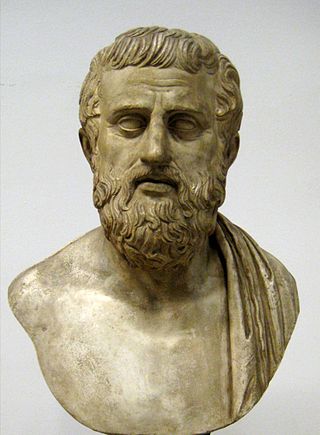Related Research Articles

Sophocles was an ancient Greek tragedian, known as one of three from whom at least one play has survived in full. His first plays were written later than, or contemporary with, those of Aeschylus; and earlier than, or contemporary with, those of Euripides. Sophocles wrote over 120 plays, but only seven have survived in a complete form: Ajax, Antigone, Women of Trachis, Oedipus Rex, Electra, Philoctetes, and Oedipus at Colonus. For almost fifty years, Sophocles was the most celebrated playwright in the dramatic competitions of the city-state of Athens which took place during the religious festivals of the Lenaea and the Dionysia. He competed in thirty competitions, won twenty-four, and was never judged lower than second place. Aeschylus won thirteen competitions, and was sometimes defeated by Sophocles; Euripides won four.

The 5th century BC started the first day of 500 BC and ended the last day of 401 BC.
The 0s BC were the period between 9 BC and 1 BC, the last nine years of the before Christ era. It is one of two "0-to-9" decade-like timespans that contain nine years, along with the 0s.
This article concerns the period 549 BC – 540 BC.
This article concerns the period 519 BC – 510 BC.
This article concerns the period 449 BC – 440 BC.

This article concerns the period 409 BC – 400 BC.
This article concerns the period 429 BC – 420 BC.
Year 401 BC was a year of the pre-Julian Roman calendar. At the time, it was known as the Year of the Tribunate of Potitus, Cossus, Camillus, Ambustus, Mamercinus and Iullus. The denomination 401 BC for this year has been used since the early medieval period, when the Anno Domini calendar era became the prevalent method in Europe for naming years.
Year 425 BC was a year of the pre-Julian Roman calendar. At the time, it was known as the Year of the Tribunate of Atratinus, Medullinus, Cincinnatus and Barbatus. The denomination 425 BC for this year has been used since the early medieval period, when the Anno Domini calendar era became the prevalent method in Europe for naming years.
Year 468 BC was a year of the pre-Julian Roman calendar. At the time, it was known as the Year of the Consulship of Barbatus and Priscus. The denomination 468 BC for this year has been used since the early medieval period, when the Anno Domini calendar era became the prevalent method in Europe for naming years.

Qin Shi Huang was the founder of the Qin dynasty and the first emperor of China. Rather than maintain the title of "king" borne by the previous Shang and Zhou rulers, he assumed the invented title of "emperor", which would see continuous use by monarchs in China for the next two millennia.

King Ling of Zhou, personal name Ji Xiexin, was a king of the Chinese Zhou dynasty. He died in 545 BC.
King Zhending of Zhou, personal name Ji Jie, was a king of the Chinese Zhou dynasty. He ruled between 468 BC and 441 BC.
King Ai of Zhou personal name Ji Quji, was a king of China's Zhou dynasty. He was the eldest son of King Zhending.
King Si of Zhou, personal name Ji Shuxi, was a king of the Chinese Zhou dynasty.

The Dionysia was a large festival in ancient Athens in honor of the god Dionysus, the central events of which were the theatrical performances of dramatic tragedies and, from 487 BC, comedies. It was the second-most important festival after the Panathenaia. The Dionysia actually consisted of two related festivals, the Rural Dionysia and the City Dionysia, which took place in different parts of the year. They were also an essential part of the Dionysian Mysteries.
Duke Wu of Jin, ancestral name Ji (姬), given name Cheng (稱) and also known as Duke Wu of Quwo, was the eighteenth ruler of the state of Jin. He was also the last ruler of the state of Quwo before he gained the title as the duke of Jin.
References
- ↑ Slater, Niall W. (October 24, 2013). Euripides: Alcestis. A&C Black. p. 1. ISBN 978-1-78093-475-4.
- ↑ Markantonatos, Andreas (March 20, 2015). Brill's Companion to Sophocles. BRILL. p. 118. ISBN 978-90-04-21762-1.